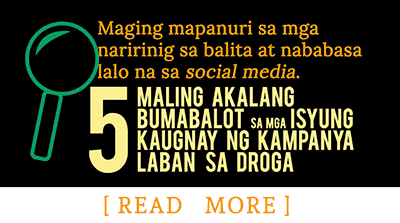Green ribbons decorated the Central Office of the Deparment of Environment and Natural Resources (DENR), Friday, September 18.
Various organizations and individuals, led by the Philippine Misereor Partnership Incorporated (PMPI), held picket demanding the protection of declared protected areas of the country. The protesters tied green ribbons at the gates and fences of the compound as a “symbolic act of their commitment to ensure the protection of the Philippine environment.”
After the programme at the DENR, the group walked towards the Mines and Geosciences Bureau Central Office along North Avenue to call the attention of MGB regarding the rampant mining in protected areas.
“A grim situation of some of our protected areas was made public last month when Philippine eagle Pamana was found dead inside the Mount Hamiguitan Wildlife Sanctuary,” Ed Garingan of PMPI said. “There is clearly a disconnect with this tragedy and the fact that Mt. Hamiguitan is a protected site and was even declared a World Heritage Site in June 2014. This begs the question, what kind of protection are our protected sites really getting?”
Garingan also said that aside from the unfortunate death of Pamana, the public must also be informed that some protected areas are also being exploited for profit by mining companies. He cited the case of Manicani island which has been declared as part of the Guiuan Protected Seascapes and Landscapes as per Presidential Proclamation 469.
In the case of Manicani, Rebecca Destajo coordinator of of the Save Manicani Movement (SAMAMO) attended the protest as they believe that “Manicani needs all the protection it could get.”
“If all Filipinos can only see the destruction brought about by mining in Manicani, they will be moved to tears if not into action against the mining operations there. The once idyllic island now looks ugly because of denuded forests, siltation, and a huge open pit left by the suspended Hinatuan Mining Corporation,” said Destajo.
Destajo also added that the people of Manicani, through SAMAMO, are questioning the hauling and loading of the remaining nickel ores from the island.
“It is the first time I have learned that we can export waste if it is true that the stockpiles are waste,” she said. “I don’t understand how a supposedly suspended company will be able to earn profit by transporting and selling nickel ores. Maybe they changed the definition of “suspended.
PMPI Advocacy Officer Primo Morillo, on the other hand, shared that the reason for hauling is due to the hazards posed by the said stockpile. The proofs to their claims, however, are not enough. Even the government agencies are issuing conflicting studies regarding the grade of the stockpiles.
“The mining permit of HMC will end in 2017,” said Morillo. “The most important question now as to the mining project is its plan for the rehabilitation of the island and no longer about its resumption of mining operation. In our view, the supposed post-mining rehabilitation of the island should commence by next year and that no extension must be given to HMC’s permit in recognition of the island’s being a protected area.”
Garingan added that the action is PMPI’s contribution to the Mining Hell Week campaign of Alyansa Tigil Mina (ATM).
“The ribbons that we have tied in DENR is a visual reminder of the shameful state of a number of our supposed protected areas. The situation in Manicani, if it will be known to more people, will open our eyes to the continuing struggle of Philippine nature, the so-called protected areas included,” Garingan concluded.
Participating organizations include ATM, Philippine Movement for Climate Justice, Save Manicani Movement, Diocesan Social Action Center of Borongan, Community Organizers Multiversity, Aniban ng Manggagawa sa Agrikultura, SANLAKAS Piglas-Kababaihan, Freedom from Debt Coalition, Kongreso ng Pagkakaisa ng Maralita ng Lungsod.
PMPI is network of about 300 civil society organizations and church-based groups in the Philippines working on four thematic concerns such as peace, sustainable agriculture, climate change and the anti-mining campaign.

